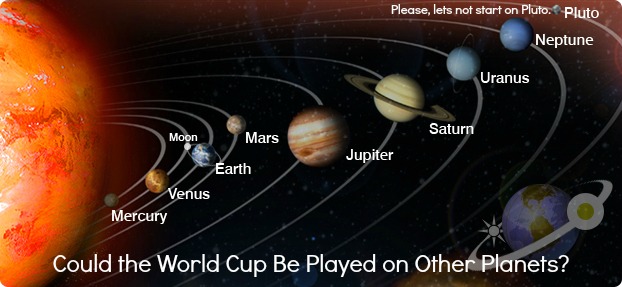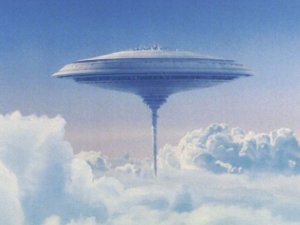

As most of the world knows, the World Cup is currently going on. Before the World Cup officially started, Sepp Blatter, the Fifa president, made a rhetorical satement, “we shall wonder if one day our game is played on another planet. Why not? Then, we will have not only a World Cup, but we will have inter-planetary competitions. Why not?”
Whereas it’s fun to imagine playing our favorite sports on other planets, is that really a practical thing? Not really.
Almost every sporting event on Earth is centered around gravity (which is kind of cool to think about, we’re playing with gravity). We might (maybe) be able to have an intergalactic competition, where we compete with other humans living on worlds of approximately 1 Earth mass, but an interplanetary one is probably out of the question because the gravity is different.
Think about a competition between a Martian team and an Earth team? If played on Mars, the Earth team would be much stronger since they are use to playing under stronger gravity. If played on Earth, the Martian team would be basically cripple. In order for that to work, both teams need to have players that live in and play in an extremely similar gravitational field.
Atmosphere is another concern. Even on Earth, when sports teams move around a country or around the world, the athletes can have issues breathing (mostly in regards to elevation). It’s possible one team could be handicapped by their inability to breath the other team’s air with the needed efficiency. For right now, none of the other objects in our solar system have a breathable atmosphere, so we’d either need to play in domes or specially designed suits. Personally, I don’t like the idea of playing a sport in a suit that’s keeping me from being exposed to a lethal environment.

Speaking of environment, lets look at some of our most predominant examples in the solar system.
The moon is the only other planetary body humans have been too. It’s also the only other planetary body to have sports played on it, as seen during the Apollo 14 mission when Alan Sheppard teed-off on the moon’s surface. Interesting factoid, despite our athlete’s best efforts, they could not throw, kick, or hit a ball/object hard enough to send it into lunar orbit. The moon’s escape velocity is about 8641 km/h (5,369 mph). The fastest recorded speed for a ball in sports is in Jai alai, there the pelota was measured traveling 302 km/h (or 188 mph). That’s about 3.5% of the moon’s escape velocity.
Mars’ problem is mostly with it’s much lighter gravity. Venus is perhaps one of the least hospitable places in the solar system, where the entire environment’s chief mission is to kill and melt everything – it literally rains acid. The gas giants have the gravity problem in reverse (though, we could technically build sky cities on these worlds that were far enough away from the core so the force on the structures was the same as Earth’s gravity – that would be cool).
So, sorry World Cup fans, you’re stuck on Earth for the foreseeable future.